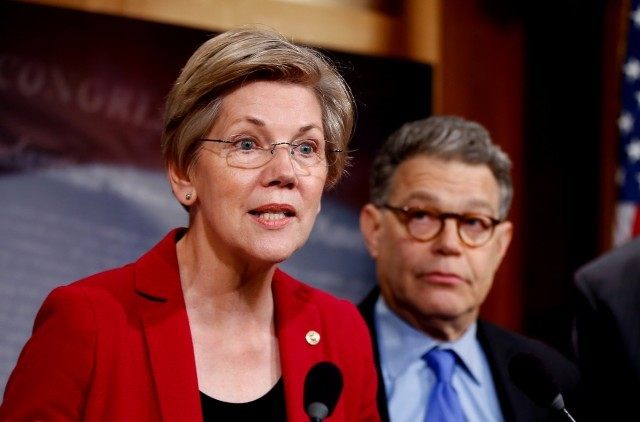WASHINGTON (AP) — Republicans and liberal Democrats have found something to agree on: Both want to keep alive the prospect that Massachusetts Sen. Elizabeth Warren will run for president.
People on each side are driven by self-interest as they cling to a dream that is all but certain to remain in the realm of fantasy. The left flank of the Democratic Party wants Warren to challenge Hillary Rodham Clinton in the primary race, or at a minimum, get Clinton to adopt Warren’s tough-on-Wall Street agenda. Republicans see a Warren candidacy as a way to sow division among Democrats and boost their own fundraising.
Neither side seems to care much that Warren has repeatedly insisted that she doesn’t plan to run for president and is not taking any of the necessary steps to lay the groundwork.
Asked Monday if she wants to run for president, Warren was blunt. “I do not,” she said in an interview with Boston radio station WBUR’s “Here & Now.”
A draft-Warren group organized by the liberal MoveOn.org said Monday that labor leader Larry Cohen and environmentalist Annie Leonard were joining the movement to push the senator to run. The announcement came days after Texas land commissioner George P. Bush, son of former Florida Gov. Jeb Bush, sought donations for his father’s Right to Rise PAC to send a message to “Hillary and Elizabeth Warren.”
“Together we will show Hillary and Elizabeth Warren that they’re in for one heck of a fight,” the younger Bush wrote in a fundraising email to supporters, as if Warren were running for president.
Republicans have also used the wide reach of conservative talk radio to keep the drumbeat for a Warren candidacy alive.
“The progressive wing of the Democrat Party, which is perhaps the entire party now, really, really, really, really, really, really wants Elizabeth Warren to run,” radio host Rush Limbaugh said earlier this month. “I mean, they can taste it.”
Karl Rove, longtime political adviser to George W. Bush, said Warren could give Clinton “a scare.”
“Elizabeth Warren’s hard left prescriptions on the economy sing to the heart of the Democratic primary voters,” Rove said on the Hugh Hewitt radio show last month. Recalling Clinton’s third place finish in the 2008 Iowa caucuses, Rove added, “Remember, this contest opens up in some places that are not particularly friendly to Hillary Clinton.”
Warren has been the subject of a draft presidential campaign for months, even as she insists she won’t run. Clinton is expected to launch her presidential bid in April.
On April 20, Run Warren Run is holding an event in New York featuring Harvard law professor Lawrence Lessig, Democratic activist Van Jones and Zephyr Teachout, who mounted a surprise challenge to New York Democratic Gov. Andrew Cuomo as a member of the Working Families Party.
The Boston Globe recently published an editorial urging Warren to reconsider her decision not to run. “Democrats would be making a big mistake if they let Hillary Clinton coast to the presidential nomination without real opposition,” the newspaper’s editorial board wrote. The piece also included separate opinion pieces outlining Warren’s potential as a candidate.
Early public opinion polls, however, suggest a potential Warren presidential campaign has only the support of a narrow swath of voters within the Democratic party.
In a sign that they may be bending to reality, some liberal groups pushing Warren to run have started suggesting they would be content to see her policy positions represented in the Democratic race or have the Massachusetts senator assume another leadership post in the party.
Hours after Senate Democratic leader Harry Reid announced Friday that he wouldn’t seek re-election, the progressive group Democracy for America called on Warren to seek his Senate position.
“The Wall Street wing of the party is dying and the Elizabeth Warren wing is rising,” said Neil Sroka, the group’s communications director.
Warren’s rapid ascent to liberal Democratic hero has highlighted her willingness to buck party leaders, even some who have championed her rise.
It was President Barack Obama who helped pluck Warren from academia and brought her into the administration to set up a new consumer financial protection agency. While Obama had hoped to nominate Warren as the agency’s first director, he backpedaled after it became clear Republicans would block her confirmation. Warren later accused the White House economic team of having “picked Wall Street” when the going got tough.
Warren also broke with the White House in the winter when she opposed legislation weakening regulations on complex financial instruments known as derivatives. While she lost that fight, she succeeded in her opposition to Obama’s pick of banker Antonio Weiss to fill a top Treasury job. Weiss asked Obama to withdraw his nomination and took a post at Treasury that did not require Senate confirmation.
___
Follow Ken Thomas at http://twitter.com/kthomasDC and Julie Pace at http://twitter.com/jpaceDC

COMMENTS
Please let us know if you're having issues with commenting.